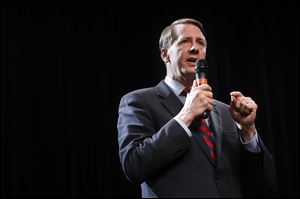
Secret data collection authored by law, not ‘bureaucrat’
8/16/2018
Richard Cordray, former federal consumer protection chief, speaks during the Ohio Democratic Party's fifth debate in the primary race for governor on April 10.
ASSOCIATED PRESS

Richard Cordray, former federal consumer protection chief, speaks during the Ohio Democratic Party's fifth debate in the primary race for governor on April 10.
The disputed Republican TV ad attacking Democratic governor candidate Richard Cordray raises legitimate issues, but does so in a misleading way.
The ad, which has so far not run in the Toledo market, attacks Mr. Cordray over his service as director of the Consumer Financial Protection Bureau. it’s supposed to help Republican nominee Mike DeWine.
WATCH: Republican Governors Association Ohio TV Ad — ‘Cordray Failed’
The U.S. Consumer Financial Protection Bureau was created after the 2008 Great Recession. Mr. Cordray, a former Franklin County treasurer who served briefly as state treasurer and state attorney general, was appointed director of that agency by President Obama.
One of the powers it was given was to collect mortgage and credit information on millions of Americans, without specifically informing them or asking permission.
A lot of Republicans believe the director of the agency was too powerful, and they tried to block Mr. Cordray’s appointment.
Mr. Cordray has made his oversight of the CFPB the centerpiece of his campaign, and his ads boast that he recovered $12 billion on behalf of consumers.
The Republican Governors Association TV ad, part of a $4 million foray into Ohio for Mr. DeWine, portrays a different CFPB than the one Mr. Cordray likes to brag about.
According to the RGA ad, Mr. Cordray “ran a powerful Washington bureaucracy that secretly collected personal information from hundreds of millions of accounts.”
“Your personal data, what you spend, Cordray secretly collected it, but didn’t protect it. And left the personal information of millions vulnerable. Hacked over 200 times. Credit card fraud, identity theft, Cordray failed to keep us safe. Richard Cordray, a collection we didn’t authorize, a charge we can’t afford.”
This is a darkly biased version of the truth.
The “collection” of data was authorized by law and has been debated in public and written about, so in that sense it’s not secret.
There were some 240 instances of data being breached or being compromised, mostly due to mistakes by contractors. but there’s no documentation of credit card fraud or identity theft as a result.
And if this data collection was so bad, you’d think that the Republican administration of President Donald Trump would end it.
Wrong.
Mr. Cordray’s successor, Mick Mulvaney, reviewed the data collection system, found it to be well secured and determined it should continue.
Mr. Mulvaney laid the groundwork for this partisan hit last spring when he said the agency suffered more than 200 data security “lapses” on Mr. Cordray’s watch involving personal information of consumers.
According to an audit by the Office of Inspector General, the CFPB collects “a significant amount of sensitive personally identifiable information,” such as consumer financial data on credit card accounts, mortgage loans, arbitration case records, automotive sales, credit scores, private student loans, and storefront payday loans.
The CFPB is supposed to collect the minimum amount of information necessary and that it protect people’s privacy rights. There were some flaws, including inadequate protection of devices. In an after-hours stroll through the building, auditors found laptops unattended, a CFPB-issued phone and thumb drive left unattended, and a CFPB employee’s password that was written on a sheet of paper and left on their desk.
The RGA could have turned that into an ad, but it might not have been quite as effective:
“A powerful Washington bureaucracy led by Richard Cordray is only in ‘substantial’ compliance with federal requirements. Not good enough, Richard Cordray!” [Grainy black-and-white image of Richard Cordray flickers across the screen.] “Tell Richard Cordray that Ohioans will settle for nothing less than complete compliance with federal data privacy policies.”
Ooooh, scary.
Until recently, organizations such as the RGA had limited ability to participate in an election for Ohio governor. They could encourage their members to make the maximum legal contribution to a political campaign, now $12,532, and the organization’s political action committee could make a contribution.
The Supreme Court’s ruling in Citizens United vs. FEC in 2010 changed all that. The court ruled that the First Amendment guarantee of free speech allows citizens and nonprofit organizations to spend as much as they want to promote candidates and issues.
While this ruling upholds free speech rights, it has also enabled the kind of repetitious, misleading advertising that dominates elections.
If the RGA wants to go negative, they should argue something truthful about Mr. Cordray. His record is not entirely without blemish.
For example, he missed some easy answers when he was a contestant on Jeopardy for five straight days back in 1987.
An election for governor should focus on what the candidate can do to make the administration of government better in his or her state. Better ways of schooling children, protecting drinking water, training workers for quality employment, building safer roads and bridges, helping beat the opioid epidemic. The list of real things goes on and on.
When we see the same TV ads over and over again, let’s stop and ask ourselves, is this ad true, and what the heck does this have to do with being governor of Ohio?
Contact Tom Troy at tomtroy@theblade.com, 419-724-6058, or on Twitter @TomFTroy.